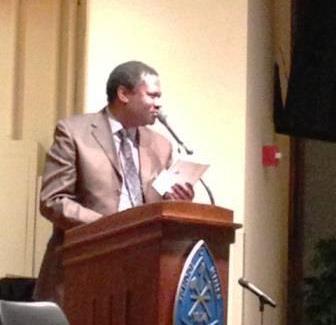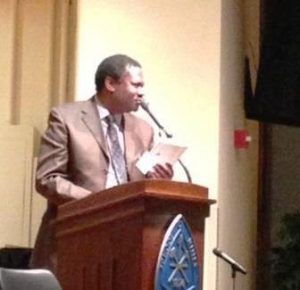Blog
Access to Energy in Africa Highlighted at Denver Conference


[/media-credit] Dr. Luka Powanga of Regis University speaking at the start of the 7th Annual Energy Africa conference in Golden, CO
The two-day conference on energy brought together many executives, decision-makers, and thought leaders from the private sector, national governments, non-government organizations, and academia from across the globe.
They came together to learn, share, collaborate, and invest in efforts of sustainable, clean energy and power systems in Africa. In the words of environmentalist and speaker at the event, Michael Schellengberger, when you bring “people to the power” the quality of life and economies of nations are elevated.
Panelists covered energy-related opportunities in Africa from the perspectives and contexts of resource developments, policy and the enabling environment, public-private partnerships, socio-economics, urbanization, and education to name a few, when describing challenges and solutions to expanding energy access in Africa.
Roughly 600 million people in Africa – nearly twice the population of the United States – live without access to electricity, and are not necessarily only in remote villages. Even for Africans who reside in urban areas and are hooked up to the grid, the actual flow of electricity is sporadic, with rolling blackouts being a regular part of life.
Due to outdated or insufficient infrastructure, countries are unable to generate enough electricity to meet demand.
Philip Mshelbila, General Manager of External Relations and Communications for Shell Companies in Nigeria, brought it closer to home when he said, ‘This is not a conference for me; this is my life.’ Mshelbila went on to describe his own intermittent access to electricity as a middle-class Nigerian living in Lagos.
Living in one of the most highly developed countries, many Americans take for granted their abundant energy resources which power their economy and make their everyday lives possible. But it wasn’t long ago that some parts of the United States resembled Africa in their lack of energy access.
Kevin Johansen, CEO of Business Catapult, said, ‘I know what it’s like to live in a house without light and water,’ as he described his childhood in rural America.
David Makongo, Partner and General Counsel at Afro-American Consortium LLC, painted a vivid picture of his childhood in Cameroon. He spent countless hours as a boy collecting and selling wood in order to buy kerosene for light, while the energy-rich ground on which he walked was mined for exportation to the richer parts of the world. That was during colonial times but it is a practice that largely remains.
Makongo, along with some others, warned against its continued practice and, instead, advocated for the retention of enough of Africa’s energy for the benefit of its people and economies.
Indeed, Africa is on the rise with the rapid and steady growth in populations and economies in countries such as Nigeria, Ethiopia, South Africa, and Kenya.
Now, more than ever before, it is imperative to invest in the development and capacity of Africans through education and skills training of both men and women, to truly overcome challenges and realize Africa’s promise.
